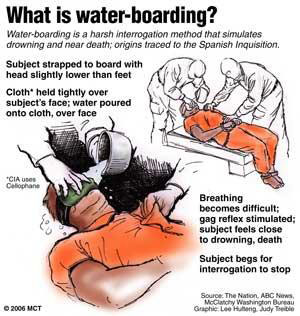Some Harvard students have produced a comprehensive study to show that, pre-9/11, the New York and the Los Angeles Times and other high-circulation dailies unequivocally referred to waterboarding as torture. Once the story of the Bush administration waterboarding detainees broke in 2004, however, not so much:
Examining the four newspapers with the highest daily circulation in the country, we found a significant and sudden shift in how newspapers characterized waterboarding. From the early 1930s until the modern story broke in 2004, the newspapers that covered waterboarding almost uniformly called the practice torture or implied it was torture: The New York Times characterized it thus in 81.5% (44 of 54) of articles on the subject and The Los Angeles Times did so in 96.3% of articles (26 of 27).
By contrast, from 2002‐2008, the studied newspapers almost never referred to waterboarding as torture. The New York Times called waterboarding torture or implied it was torture in just 2 of 143 articles (1.4%). The Los Angeles Times did so in 4.8% of articles (3 of 63). The Wall Street Journal characterized the practice as torture in just 1 of 63 articles (1.6%). USA Today never called waterboarding torture or implied it was torture.
In addition, the newspapers are much more likely to call waterboarding torture if a country other than the United States is the perpetrator. In The New York Times, 85.8% of articles (28 of 33) that dealt with a country other than the United States using waterboarding called it torture or implied it was torture while only 7.69% (16 of 208) did so when the United States was responsible. The Los Angeles Times characterized the practice as torture in 91.3% of articles (21 of 23) when another country was the violator, but in only 11.4% of articles (9 of 79) when the United States was the perpetrator.
Frye cites Orwell on the social degradation of language in “The Primary Necessities of Existence”:
Then there are various epidemics sweeping over society which use unintelligibility as a weapon to preserve the present power structure. By making things as unintelligible as possible, to as many people as possible, you can hold the present power structure together. Understanding and articulateness lead to its destruction. This is the kind of thing George Orwell was talking about, not just in 1984, but in all his work on language. The kernel of everything reactionary and tyrannical in society is the impoverishment of the means of verbal communication. The vast majority of things that we hear today are prejudices and cliches, simply verbal formulas that have no thought behind them but are put up as a pretence of thinking. It is not until we realize these things conceal meaning, rather than reveal it, that we can begin to develop our own powers of articulateness. (CW 12, 747)

